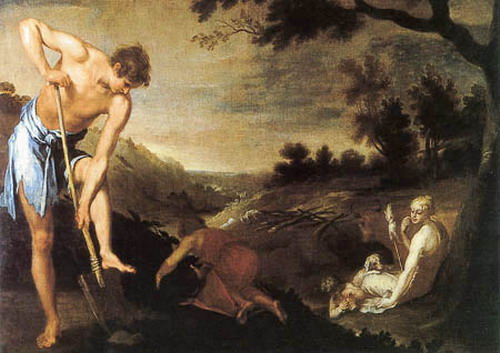Ethiopians say that their gods are
–Xenophanes (c.570-c.475 BCE)snub–nosed and black
Thracians that they are pale and red-haired
Traditional religions of virtually whatever stripe are sexist: they cast men and women in sharply different roles, with males dominant. Religion plays a leading role in establishing the sexism of most traditional cultures. But why? Would God really be a sexist?
The question may seem absurd, but a very good reason suggests why the answer might be yes:
God created the sexes.
What could possibly be the reason for that? Surely if God created different sexes, there must have been some purpose, and it stands to reason that God intended that different sexes would have different roles.
That, in turn, challenges our egalitarianism. Maybe women and men are supposed to do different things, both biologically and socially. We might wonder why biological differences imply social differences, but why not? What could possibly be the purpose of mere biological difference without some social implication? It’s hardly the best of all possible worlds.
Consider the great novel The Left Hand of Darkness, by the late Ursula Le Guin. The novel takes place far in the future, thousands of light-years away. The inhabitants of Planet Gethen are ambisexual humans. For most of the month, they have no sex characteristics, but for a few days every month, they go into the state of kemmer – what we might call “heat” — where they become male or female. There is no predisposition to one or another: a person can become male one month, female another month. They return to an androgynous state after kemmer, unless the female becomes pregnant, in which case she remains female until childbirth.
Well, if you (or perhaps You) wanted a more egalitarian society, why not do it this way? In Le Guin’s telling, every Gethenian takes part in the “burden and privilege” of raising children; rape and sexual hierarchy are absent.
So then what do we do? We could adopt traditional religious sexism, in the sense of defined and immutable gender roles based upon male domination. We could invert it like the Grateful Dead, who regularly performed a calypso song entitled “Men Smart/Women Smarter.” But for those who reject sexism, neither option satisfies.
Instead, we need to rethink this whole God thing.
Asking why God chose to create sexes rests upon an unspoken and problematic premise: that we can speak of God choosing the order of the universe. “Choosing” presumes consciousness; but we should be wary of presuming it for God. Human beings have consciousness and make choices: God operates differently. We simply cannot equate divine operations with our own.
Maimonides knew as much; indeed, the refusal to compare divine and human attributes represents the core of his “negative theology.” He asserted that we cannot say what God is, only what God is not. We cannot say that God is “living,” only that God is “not dead.” Maimonides isn’t playing word games, but rather rejecting the entire notion of divine-human comparison – the precise problem that Xenophanes ridicules in the opening epigraph.
In other words, rejecting divine sexism means rejecting divine sentience. Whatever God is and however God works, we cannot assume a divine “will” that resembles in any way a human will. God is the divine spark, a force (perhaps even The Force), not “up there,” but pulsating throughout the universe. When we say we seek the “will of God,” we seek our highest self, perhaps our essential nature.
The great Chasidic master known as the Sfas Emes (1847-1905) took a similar view (although he rejected much of other Maimonidean thought). The Sfas Emes told his grandchildren that:
the meaning of “Y-H-W-H is One” is not that He is the only God, negating other gods (though this too is true!), but that there is a deeper truth: there is no being other than God. This is true even though it seems otherwise to most people.… Everything that exists in the world, spiritual and physical, is God Himself. It was only because of the contraction [tzimtzum], willed by God that holiness descended rung after rung, until actual physical things were created out of it. These things are true without a doubt. Because of this, every person can be joined to God from any place, through the holiness that exists within every single thing, even corporeal things. You only have to be negated (that is, to transcend the ego-self) in the spark of holiness.
To ask why God created the sexes, then, misstates the nature of God. We do not pray to the Big Guy Up There: we seek God everywhere. That everywhere does not choose but merely is. Both male and female are ephemeral, waves on the ocean of eternity, waiting to be absorbed into the eternal One. God does not make our choices; God IS our choices.
–Maybe you don’t buy any of this. Perhaps you insist that God is living, is sentient, is conscious. Very well. Why, then, did God create the sexes? If not for a social reason, then for what reason? Answer for yourself.
Jonathan Zasloff teaches Torts, Land Use, Environmental Law, Comparative Urban Planning Law, Legal History, and Public Policy Clinic – Land Use, the Environment and Local Government at UCLA Law School.

